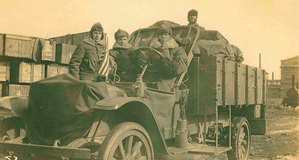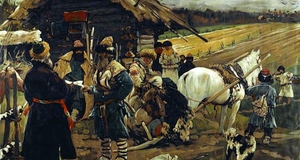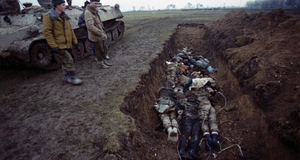When Major Johnson Ran Vladivostok:The International Military Police and the Allied Intervention in the Russian Civil War
By
2014, Vol. 6 No. 04 | pg. 2/2 | « The Formation of the International Military Police in VladivostokAs soon as additional troops arrived from the Allied countries the military commanders agreed to form a more effective policing force. The International Military Police (IMP) were born. Although the US Secretary of State cabled the American consul that "participation by United States in police operations in Vladivostok... is not believed wise,"13 Graves disagreed. Not only did the United States submit its quota of troops, it also supplied the man whose task it was to lead such a force and clean up the city, Major Samuel Johnson. It was a job that required an exceptional leader. It required a man of remarkable talent and ability. Major Samuel Johnson was not a typical Doughboy. Born in Russia as Boris Ignatiev, his life proved to be made of one adventure after another.14 Educated in Poltava, one of the finest military schools in Old Russia, he began his military career when he joined the Cossacks of the Don on one of their skirmishes. During the campaign he saved his captain's life and was recommended for the coveted St. George Cross. Because of his youth he received a minor medal instead. The disappointment was so great he cried before the entire company. Leaving the Cossacks in June 1891, he was finally allowed to go on a naval training ship cruising around the world. Just before the ship came into Philadelphia he protested the brutal treatment meted out to one of his friends and 'lost his temper.' What he did exactly remains unclear, but as a result he was put into irons and his family notified about his disgrace. The latter measure would haunt him for the remainder of his life, as he would never see his family again. Waiting for the first moment his guards were not looking, he plunged into the icy waters, chains and all, and began to swim. Someone managed to pull him out from under one of Philadelphia's old wharfs; feeding him and helping to file off his irons, the old man advised young Boris to sign on the first ship bound for South America.He arrived in Argentina in the midst of revolution. Young and idealistic he joined the side he considered to be just, but he soon became disillusioned with life in Latin America. In between the fighting he had to do many things to survive, including one stint with a circus. He decided it might be best to leave. While convalescing after receiving a deep sabre wound across his forehead in battle he escaped from the military barracks and swam to a ship going back to the United States. Stowing away in a small canvas covered lifeboat, he was discovered after two days. Fortunately, the captain befriended him and when the ship reached America he left with gratitude, even though he had to swim to shore once again. Later signing on another ship, he was discharged as an 'able bodied seaman' upon arrival at Honolulu, Hawaii, where he made his home. Enlistment in the Hawaiian National Guard eventually brought him citizenship, and by the time the United States entered the First World War he had risen through the ranks to become Adjutant General. This he resigned to enter Officer Training School and on February 18, 1918, he was appointed Major in the National Army, with orders to report to the 8th Division under the command of Major General William S. Graves at Camp Freemont, California. Months later Graves would receive the orders that would bring Major Johnson back to the land of his birth. Together with a handpicked staff Johnson set about building up the IMP. Sergeant Marvin Roda, "an excellent soldier in all respects"15, handled all detail work and furnished the manpower. Gradually a collection of soldiers, sailors and marines from over twelve nations were turned into a respectable policing force. That the force was organized under one command was no small feat, but the fact that it became effective was almost a miracle. "The condition of lawlessness in Vladivostok is steadily and rapidly increasing," Johnson reported to his superiors. "This is now one of the first cities in the world in the point of criminals and number of criminal bands organized for murder, robbery, smuggling, etc... there are more criminals of what might be called the higher class... than any where else in the world." Had Johnson known the meaning of fear he may have realized the undesirability of his assignment. On the second day on the job he posted large square placards in places frequented by criminals. On each was written: "From now on the International Military Police will be responsible for law and order in Vladivostok. All crimes and depredations will be summarily dealt with." Johnson personally signed each declaration. By late afternoon most of his placards had been scratched or slashed to pieces. On others were written: "Who the hell are you? We will fix you" and "You'll go home in a coffin".16 These were no idle threats. The former Chief of Police was found dead one morning. After bandits had kidnapped him they ripped open his stomach and placed his arms cross wise inside--after they had been hacked off at the shoulders. It was his ninth day on the job. Scrawled on one of Johnson's placards was that special reference, "remember what happened to Nikitoff?" Whilst out on patrol with a Czech Officer one night in an isolated district a shot was fired that struck a wall just between their heads. The assassination attempt only strengthened the major's resolve. Although a gypsy fortuneteller predicted that he would meet death in a violent manner, Johnson remained determined to carry out his duties. _______________________ With its slide into chaos, Vladivostok assumed all the vices and bad habits of a city in decline. Alcohol and narcotics, not always of the highest quality, could be easily and cheaply obtained. Vodka houses proliferated along the city's streets and alleys. Riots and brawls were nightly occurrences. A first priority was to prevent brawls among his own policemen. There was no love lost between the Americans and the Japanese, and too many other national grudges to mention. Johnson divided the city into twelve sectors, placing one nation in charge of each. He was more direct in protecting other soldiers and sailors from the city and themselves. In the cold weather Alcohol could be especially lethal. An unconscious man could freeze to death in an hour--if the criminal element didn't get him first. Johnson drew up maps showing forbidden territories in the city and strong patrols were placed around them. These were the areas he could keep troops away from. For those he could not, other measures were needed. There were no fewer than one hundred and twenty six licensed brothels. The most well-known and popular area was Kopek Hill, the city's 'red light' district. Sexually transmitted diseases reached epidemic levels. At the insistence of Johnson, the city's doctors met to discuss the scourge. A system of twice weekly medical inspections was devised for the women who would need a "certificate of freedom of disease".17 American soldiers were shown a film called "End of the Road," which took one on a tour of the wards of the largest hospitals of the United States and shown sufferers of venereal diseases.18 His measures began to pay off. After only a few weeks the number of riots and brawls lessened and the spread of disease was checked. The war on crime was also relatively successful, but not without cost. Instead of facing drunken and troublesome soldiers, the IMPs faced bullets. Before the end of the Allied intervention, fifty-one members of the police force fell in the line of duty.19 By that time Bolshevik forces were pushing their way through Siberia. The capital of the White effort, Omsk, fell to the Reds in the winter of 1919. The self-styled 'Supreme Leader' of All the Russias, Alexander Kolchak, had his retreat cut short when he was captured and executed at Irkutsk, near Lake Baikal. U.S. troops were called back to Vladivostok for imminent withdrawal. They had spent the past year defending sectors of the Trans-Siberian railway from partisan attacks. In the new year these partisans sent a delegation to the city to discuss delivering the city into their control. Sam Johnson and one hundred troopers were waiting to meet them and escort them to deliver their message.20 On the way they were confronted by a company of Japanese infantrymen, rifles aimed at the Russians. Undeterred, Johnson ordered his men to surround the partisans. Several tense moments followed until the Japanese backed down, and shortly afterward the message was delivered. On the 31st of January the partisans proudly marched into the city and formed Vladivostok's seventh government since 1917. Honoring Johnson and the achievement of the IMP, the partisans offered a detachment of their own for the force, however, the American Expeditionary Force had already begun to depart Russian soil by this time. On April 1, 1920, with the withdrawal of the last American troops, the International Military Police ceased to exist. Major Johnson left as one of the most decorated soldiers of the First World War. He had received honors from twelve nations, including the St. George Cross so coveted in his youth after he recued several civilians, including a Russian general and his family. For that action on the night November 17-18, 1919 he was also awarded the Distinguished Service Cross by President Warren G. Harding. _______________________ Only three days after the last American transport left the Far East, the Japanese attacked the city and drove the partisans back into the hills. The Japanese were to remain in Russia for two more years, fighting for control of the resource rich Amur basin. The following day, April 5, Vladivostok was in Japanese hands. After suffering the depredations of 1917-18, and enjoying a semblance of order and stability imposed by the IMP, the citizens of Vladivostok were again facing turmoil. It was not until 1922 that the city reverted once and for all to Russian control. Bowing to pressure within Japan and condemnation from abroad, the Japanese infantry withdrew and the intervention in Siberia was finally ended. Endnotes
Suggested Reading from Inquiries Journal
Inquiries Journal provides undergraduate and graduate students around the world a platform for the wide dissemination of academic work over a range of core disciplines. Representing the work of students from hundreds of institutions around the globe, Inquiries Journal's large database of academic articles is completely free. Learn more | Blog | Submit Latest in History |


















